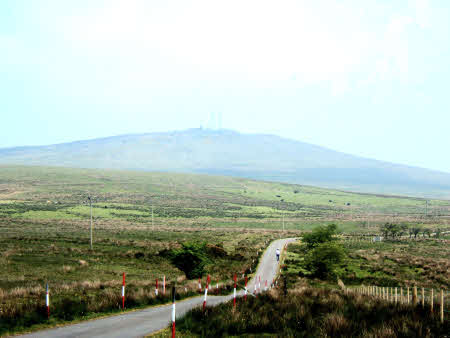
Cow Quake
THE DIGGER

The serenity of Divis mountain is deceptive. Harsh weather conditions after the cattle were put out on Divis on the 12th May each year could cause a headache for the farmer.
There are many sayings associated with the month of May. Many of these appeared in print in the late 1870’s and had associations with the weather in the “merry month.”
- “Change not a clout, till May be out.”
- “A cold May enriches no-one.”
- “A cold May and a windy, makes a barn full and findy.”
- “A wet May will fill a byre full of hay.”
- “A rainy May marries peasants.”
- “Water in May is bread all the year.”
- “A leaking May and a warm June, bring on the harvest very soon.”
- “Mist in May, heat in June, make the harvest come right soon.”
- “A dry May and a dripping June, bring all things into tune.”
- “A hot May makes a fat churchyard.”
- “If Janiveer calends be summerly gay, ‘twill be winery weather till the calends of May.”
- “A windy March and a showery May make a beautiful May.”
- “March wind and May sun makes clothes white and maids dun.”
- “May, come she early or come she late, she’ll make the cow to quake.”
Cow-quake was a term on the lips of every farmer in times gone by. It was found amongst cattle who were being put out to graze in May time, having spent the winter in byres.
I was fortunate to have been given some notes made by a well-known local historian the late Jean Totten, who resided in the Ballinderry area, close to the shores of Lough Neagh. She had the foresight to collect and write down stories from the older folks in the district in the 1950’s.
On the 15th May 1958 Jean had recorded a story from a lady, born in the 1880’s, and residing in the Lisburn area. The story had been passed to this lady from her grandmother, who had lived in the years 1835 - 1915, and hailed from Knocknadona. I quote directly from Jean’s notes-
“Cow Quake. I remember when I was a little girl the cows were always put out to grass on the twelfth of May. My grandmother used to tell me when she was young, if a storm should come on anytime during the first few days the cows were out, should it be twelve o’clock at night, grandfather made them all get out of bed and bring the cows all in and keep them there until the storm was over as it was very bad for them.”
In times past May and November were the months of the hiring fairs when farmers sought out servants and farmhands and employed then on a contractual basis. The twelfth of May was a significant date in the agricultural calendar. There are those who can still recall cattle being taken from farms around the eastern shores of Lough Neagh and driven to the higher ground at Divis mountain for summer grazing. The cattle were put there on the 12th May and left there to the 12th November, weather dependant. Cattle were branded on the hoof in order that farmers could distinguish between them. Sometimes it was necessary for some of the local farmers in the Divis area to put cattle out and in over a two week period to prepare them for their newly acquired surroundings. One story passed down from the previous generation recalled a time when the cattle had to be taken off the mountain due to a snowfall in May. This was from an era when geese were also driven up onto the mountain. Of course during wet periods the cattle would naturally head for the shelter of the hedgerows. I was told that when the cattle were seen heading up the Divis mountain to higher grazing it could be taken as a sign of good weather.
To the western side of Divis, in the parish of Tullyrusk there is a place known as “Quakerfield.” Despite numerous enquires I have yet to establish the origins of the name in this area. Some have suggested that the word “Quake” had some connection with the “cow quake” and cattle, but the jury are still out on that one.
Thanks to the Totten family for granting permission to use extracts from Jean Totten’s notes.
The Digger can be contacted or by emailing diggerarticle@hotmail.com
14/03/2012
